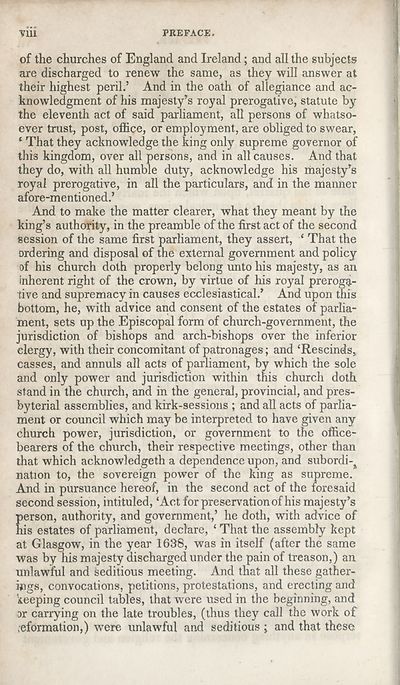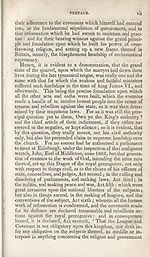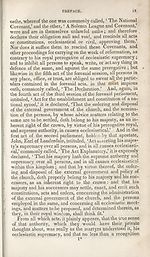Religion & morality > Cloud of witnesses, for the royal prerogatives of Jesus Christ, or, The last speeches and testimonies of those who suffered for the truth in Scotland, in the years 1681-1688, with an appendix, containing the Queensferry paper, Torwood excommunications, &c
(28)
Download files
Complete book:
Individual page:
Thumbnail gallery: Grid view | List view

PREFACE.
V1U
of the churches of England and Ireland; and all the subjects
are discharged to renew the same, as they will answer at
their highest peril.’ And in the oath of allegiance and ac¬
knowledgment of his majesty’s royal prerogative, statute by
the eleventh act of said parliament, all persons of whatso¬
ever trust, post, office, or employment, are obliged to swear,
‘ That they acknowledge the king only supreme governor of
this kingdom, over all persons, and in all causes. And that
they do, with all humble duty, acknowledge his majesty’s
royal prerogative, in all the particulars, and in the manner
afore-mentioned.’
And to make the matter clearer, what they meant by the
king’s authority, in the preamble of the first act of the second
session of the same first parliament, they assert, ‘ That the
ordering and disposal of the external government and policy
of his church doth properly belong unto his majesty, as an
inherent right of the crown, by virtue of his royal preroga¬
tive and supremacy in causes ecclesiastical.’ And upon this
bottom, he, with advice and consent of the estates of parlia¬
ment, sets up the Episcopal form of church-government, the
jurisdiction of bishops and arch-bishops over the inferior
clergy, with their concomitant of patronages; and ‘Rescinds*
casses, and annuls all acts of parliament, by which the sole
and only power and jurisdiction within this church doth
stand in the church, and in the general, provincial, and pres-
byterial assemblies, and kirk-sessions ; and all acts of parlia¬
ment or council which may be interpreted to have given any
church power, jurisdiction, or government to the office¬
bearers of the church, their respective meetings, other than
that which acknowledgeth a dependence upon, and subordi-^
nation to, the sovereign power of the king as supreme.
And in pursuance hereof, in the second act of the foresaid
second session, intituled, ‘Act for preservation of his majesty’s
person, authority, and government,’ he doth, with advice of
his estates of parliament, declare, ‘ That the assembly kept
at Glasgow, in the year 1638, was in itself (after the same
was by his majesty discharged under the pain of treason,) an
unlawful and seditious meeting. And that all these gather¬
ings, convocations, petitions, protestations, and erecting and
keeping council tables, that were used in the beginning, and
or carrying on the late troubles, (thus they call the work of
.eformation,) were unlawful and seditious ; and that these
V1U
of the churches of England and Ireland; and all the subjects
are discharged to renew the same, as they will answer at
their highest peril.’ And in the oath of allegiance and ac¬
knowledgment of his majesty’s royal prerogative, statute by
the eleventh act of said parliament, all persons of whatso¬
ever trust, post, office, or employment, are obliged to swear,
‘ That they acknowledge the king only supreme governor of
this kingdom, over all persons, and in all causes. And that
they do, with all humble duty, acknowledge his majesty’s
royal prerogative, in all the particulars, and in the manner
afore-mentioned.’
And to make the matter clearer, what they meant by the
king’s authority, in the preamble of the first act of the second
session of the same first parliament, they assert, ‘ That the
ordering and disposal of the external government and policy
of his church doth properly belong unto his majesty, as an
inherent right of the crown, by virtue of his royal preroga¬
tive and supremacy in causes ecclesiastical.’ And upon this
bottom, he, with advice and consent of the estates of parlia¬
ment, sets up the Episcopal form of church-government, the
jurisdiction of bishops and arch-bishops over the inferior
clergy, with their concomitant of patronages; and ‘Rescinds*
casses, and annuls all acts of parliament, by which the sole
and only power and jurisdiction within this church doth
stand in the church, and in the general, provincial, and pres-
byterial assemblies, and kirk-sessions ; and all acts of parlia¬
ment or council which may be interpreted to have given any
church power, jurisdiction, or government to the office¬
bearers of the church, their respective meetings, other than
that which acknowledgeth a dependence upon, and subordi-^
nation to, the sovereign power of the king as supreme.
And in pursuance hereof, in the second act of the foresaid
second session, intituled, ‘Act for preservation of his majesty’s
person, authority, and government,’ he doth, with advice of
his estates of parliament, declare, ‘ That the assembly kept
at Glasgow, in the year 1638, was in itself (after the same
was by his majesty discharged under the pain of treason,) an
unlawful and seditious meeting. And that all these gather¬
ings, convocations, petitions, protestations, and erecting and
keeping council tables, that were used in the beginning, and
or carrying on the late troubles, (thus they call the work of
.eformation,) were unlawful and seditious ; and that these
Set display mode to:
![]() Universal Viewer |
Universal Viewer | ![]() Mirador |
Large image | Transcription
Mirador |
Large image | Transcription
| Permanent URL | https://digital.nls.uk/132215975 |
|---|
| Description | Thousands of printed books from the Antiquarian Books of Scotland collection which dates from 1641 to the 1980s. The collection consists of 14,800 books which were published in Scotland or have a Scottish connection, e.g. through the author, printer or owner. Subjects covered include sport, education, diseases, adventure, occupations, Jacobites, politics and religion. Among the 29 languages represented are English, Gaelic, Italian, French, Russian and Swedish. |
|---|

